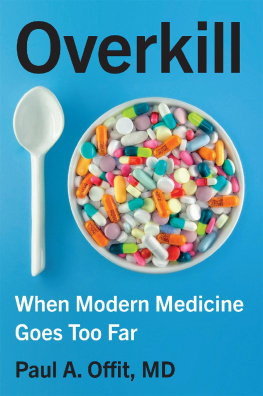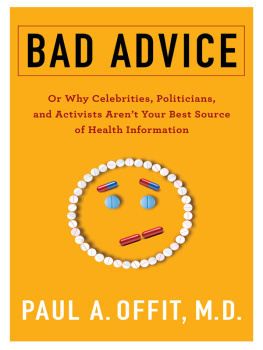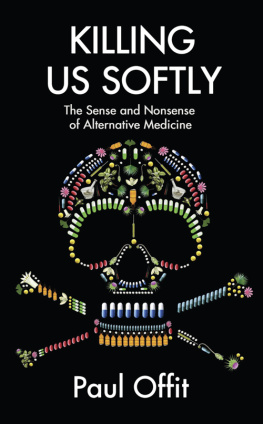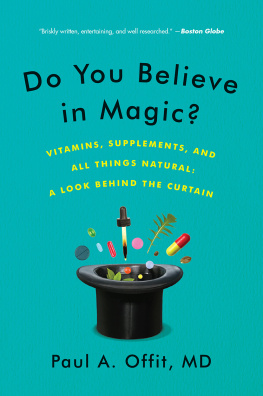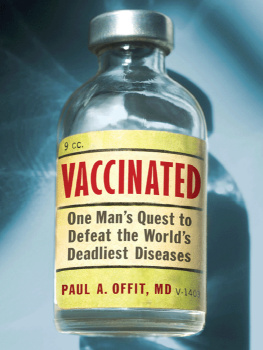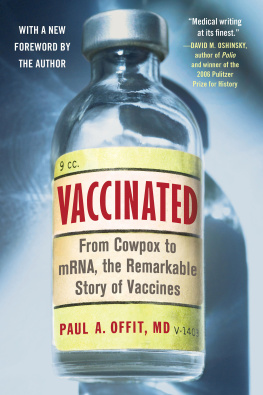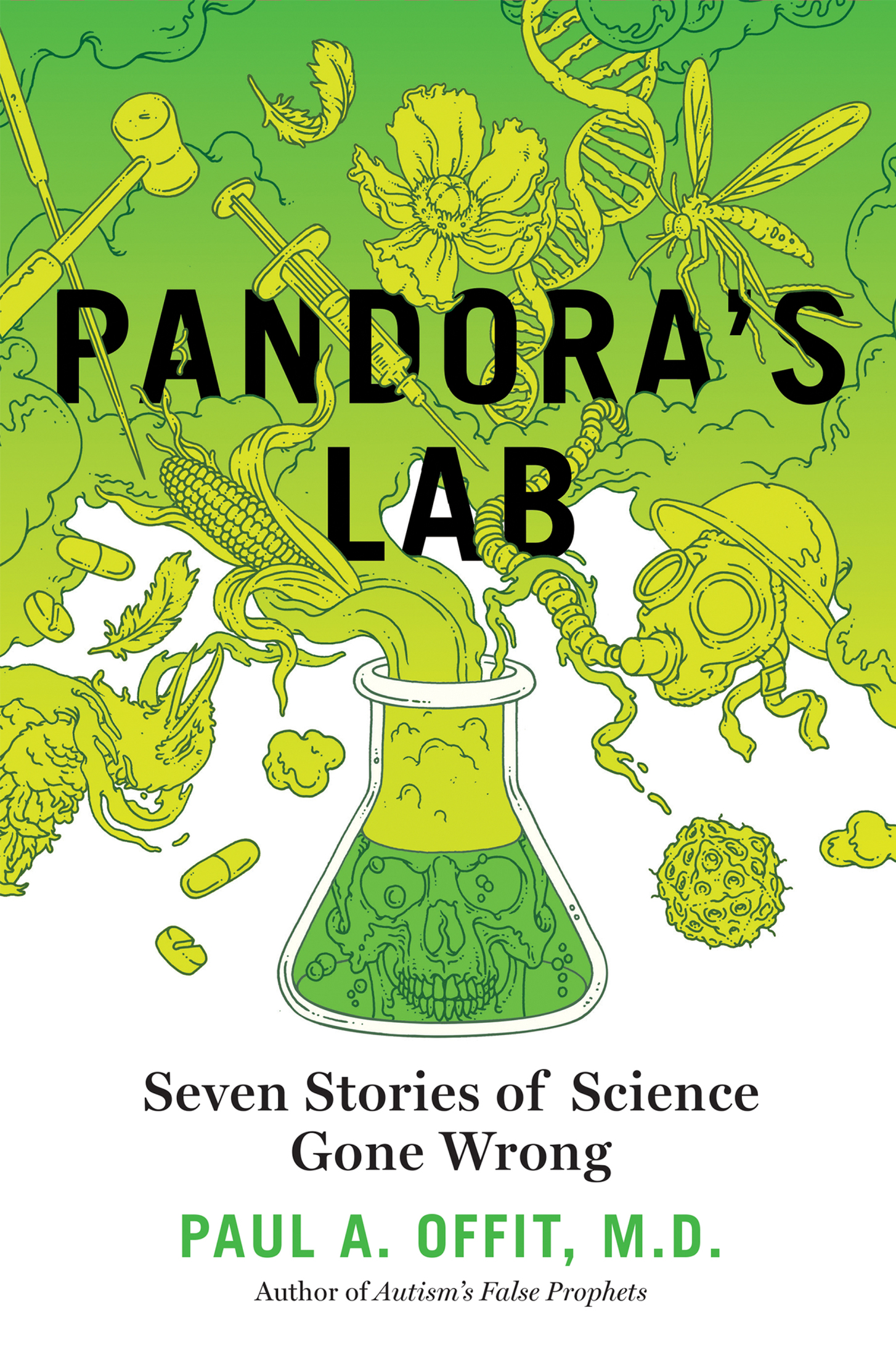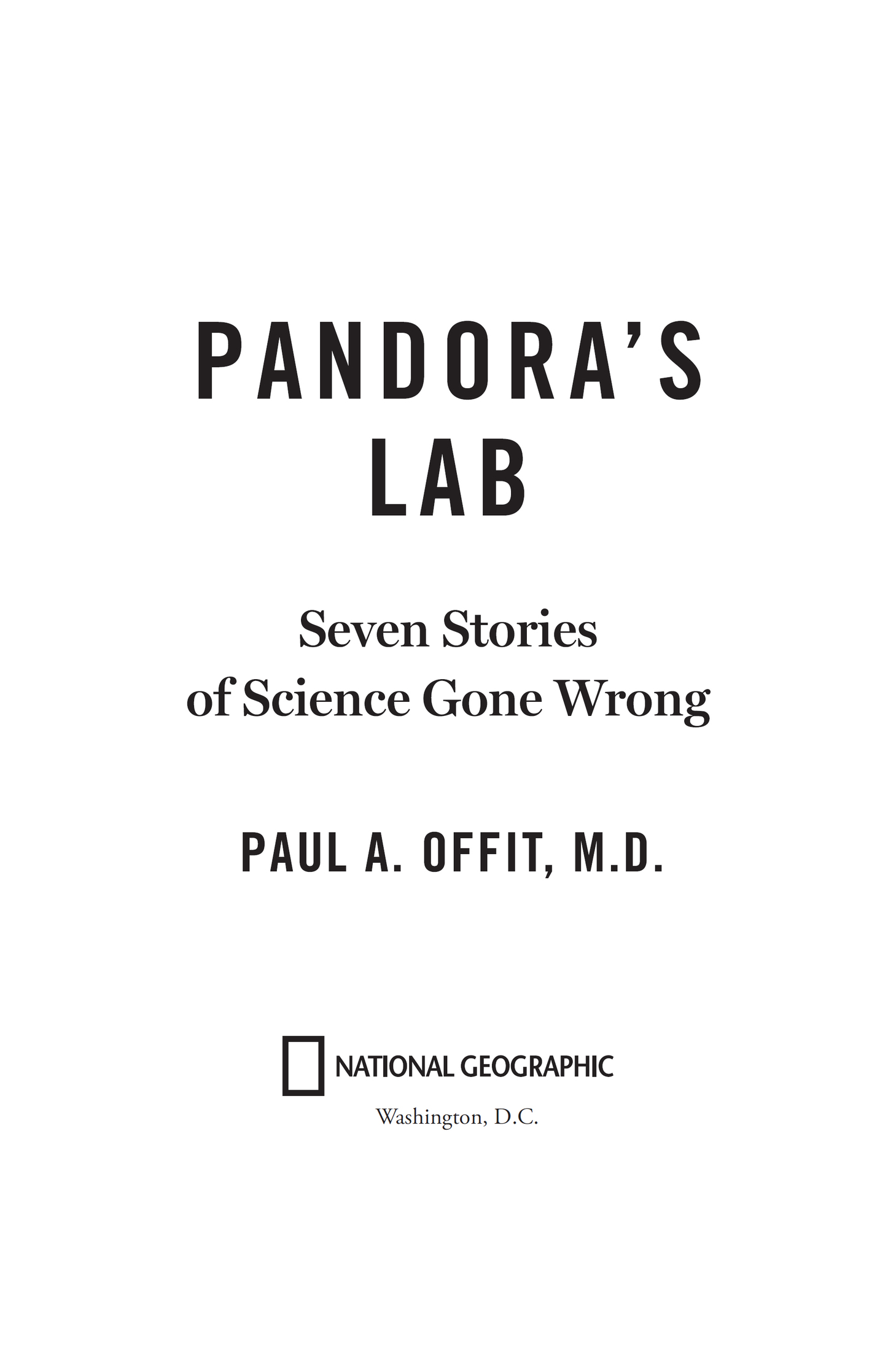Contents
Published by National Geographic Partners, LLC
1145 17th Street NW, Washington, DC 20036
Copyright 2017 Paul A. Offit. All rights reserved. Reproduction of the whole or any part of the contents without written permission from the publisher is prohibited.
NATIONAL GEOGRAPHIC and Yellow Border Design are trademarks of the National Geographic Society, used under license.
Library of Congress Cataloging-in-Publication Data
Names: Offit, Paul A.
Title: Pandoras lab : seven stories of science gone wrong / Paul A. Offit, M.D.
Description: Washington, D.C. : National Geographic, [2016] | Includes bibliographical references.
Identifiers: LCCN 2016030737 | ISBN 9781426217982 (hardcover : alk. paper)
Subjects: LCSH: Errors, Scientific.
Classification: LCC Q172.5.E77 O34 2016 | DDC 001.9/6dc23
LC record available at https://lccn.loc.gov/2016030737
Ebook ISBN9781426217999
Since 1888, the National Geographic Society has funded more than 12,000 research, exploration, and preservation projects around the world. National Geographic Partners distributes a portion of the funds it receives from your purchase to National Geographic Society to support programs including the conservation of animals and their habitats.
National Geographic Partners
1145 17th Street NW
Washington, DC 20036-4688 USA
Become a member of National Geographic and activate your benefits today at natgeo.com/jointoday.
For rights or permissions inquiries, please contact National Geographic Books
Subsidiary Rights:
Interior design: Katie Olsen
v4.1
a
To my wife, Bonnie, who listened patiently
while I talked about rotavirus surface proteins
during far too many dinners and vacations;
and to our children, Will and Emily,
who make everything worthwhile.
But [Pandora] took off the great lid of the jar with her hands
and scattered all [that] caused sorrow and mischief
Hesiod, Works and Days
INTRODUCTION
Invention does not consist of creating out of void, but out of chaos.
Mary Shelley
T he Franklin Institute in Philadelphia is home to the Benjamin Franklin National Memorial. Founded in 1824, its one of the oldest science education centers in the United States. In 2014, the institute featured 101 Inventions That Changed the World. When I visited this exhibition with my son, who is a science writer, we tried to guess which inventions made the list. We got a lot of them right, but some were surprising.
The top three inventions were pasteurization, paper, and controlled fire; rounding out the list were the sail, air-conditioning, and the Global Positioning System (GPS). Among others were the telephone, cloning, the alphabet, penicillin, the spinning wheel, vaccination, transistor radios, email, and aspirin. Two inventions that my son and I would never have predicted were gunpowder (number 20) and the atomic bomb (number 30)both of which have arguably done far more harm than good. This suggested the possibility of another list: 101 Inventions That Changed the WorldFor the Worse.
During the past few years, Ive asked doctors, scientists, anthropologists, sociologists, psychologists, skeptics, and friends to provide a list of what they think were the worlds worst inventions. In the end, I had about 50 from which to choose. Initially, I thought Id limit the list to discoveries that had caused the most deaths (like explosives). Then I focused only on those that had harmed the environment (like the refrigerant Freon). In the end, I settled on inventions that were not only the most surprising (at least to me) but also ones whose impact is still felt today.
H ERE ARE THE SEVEN FINALISTS:
Six thousand years ago, the Sumerians discovered a plant called hul gil, the plant of joy, which gave birth to a drug that now kills 20,000 Americans every year. More young adults die from this drug than from motor vehicle accidents.
In 1901, a German scientist performed an experiment that revolutionized the food industry. A hundred years later, an editorial in the prestigious New England Journal of Medicine stated, On a per calorie basis, [this product] appears to increase the risk of heart disease more than any other macronutrient. The Harvard School of Public Health estimated that eliminating it from the American diet would prevent 250,000 heart-related deaths every year.
In 1909, another German scientist invented a chemical reaction that won the Nobel Prize, allowed us to feed more than seven billion people across the globe, and unless we do something about it, will probably end life on this planet.
In 1916, a New York City conservationist wrote a scientific treatise that caused Congress to pass a series of draconian immigration laws, enabled the forced sterilization of tens of thousands of American citizens, and provided a scientific rationale for Adolf Hitler to murder six million Jews. Echoes of this treatise can be heard today when politicians like Donald Trump denounce Mexican immigrants, calling them rapists and murderers.
In 1935, a Portuguese neurologist invented a surgical cure for psychiatric disorders that won a Nobel Prize, took only five minutes to perform, caused President John F. Kennedys sister to be permanently disabled, and is now a subject of horror films. Remnants of this dangerous quick-fix procedure can be found today in promised cures for one of the most common psychiatric disorders of childhood: autism.
In 1962, a popular naturalistthe mother of the modern environmental movementwrote a book that led to the ban of one particular pesticide. The prohibition was hailed by environmental activists but feared by public health officials. Their fears were well founded; as a consequence of the ban, tens of millions of children died needlessly.
In 1966, with the power of two Nobel Prizes behind him, an American chemist elevated the word antioxidant into the pantheon of cant-miss marketing terms. Unfortunately, those who have followed his advice have only increased their risks of cancer and heart disease. Worse, he gave birth to an industry whose harm can be found today in the sudden need for liver transplants in Hawaii or in the strange onset of masculinizing symptoms in women in the Northeast.
A LL OF THESE STORIES ARE UNITED by a myth that dates back to 700 B.C. the myth of unintended consequences. Zeus, angry that Prometheus had stolen fire from the gods, was intent on punishing mankind. So he gave a marvelous jeweled box to Pandoraits contents, a secret. When Pandora opened the box, which she had been warned not to do, a stream of ghostly creatures representing disease, poverty, misery, sadness, death, and all manner of evil escaped. Pandora closed the box, but too late. Only hope remained.



